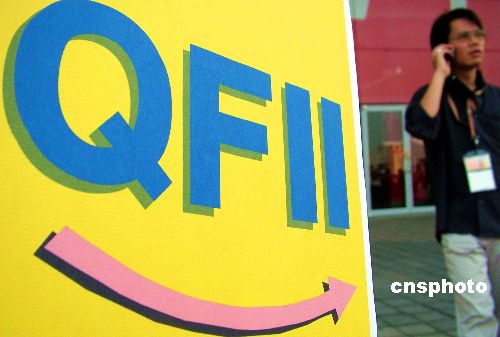What a larger QFII means
- By Sun Qing
 0 Comment(s)
0 Comment(s) Print
Print E-mail China.org.cn, April 10, 2012
E-mail China.org.cn, April 10, 2012
|
|
|
[File photo] |
With the capital market still closed for the traditional Chinese tomb sweeping holiday (on April 2-4), the China Securities Regulatory Commission (CSRC) issued a bulletin, saying that the CSRC, the People's Bank of China (PBOC) and the State Administration of Foreign Exchange (SAFE) have leveled up the ceilings of Qualified Foreign Institutional Investor (QFII) by 50 billion US dollars from the original 30 billion to 80 billion, a significant step forward.
Although many investors were still on holiday when the news broke, news of such bullish magnitude would certainly not have escaped them. Economic observers, too, have reacted to the news with excitement, as it represents a bigger stride toward the opening up of China's capital account. Doubtless, future substantial investors in the Chinese capital market are equally excited by the news.
As for the Chinese equity market, the effect is direct: Increasing the capital supply is definitely good for the current stock market, especially when the market is undergoing a new round of reforms. The unlisted stock exchange system is waiting to face the public, which will dilute the current market to some extent.
In addition, QFII is generally allocated to institutional investors who prefer long-term investments and who could, therefore, play a role in helping stabilize the volatile market.
After the news came out, the Shanghai Composite Index rose by 1.4 percent, despite the general downward trend across other Asian markets on April 6, the first trading day after the holiday.
Another market directly influenced by this news is the off-shore RMB market in Hong Kong, with greater inflow and increased pressure on the RMB to appreciate, elements which provide a long term opportunity for currency gains for those asset managers who hold RMB in their portfolios. Together with the news of 50 billion RMB RQFII, this so-called dim sum bond market will become reactivated as more Chinese companies go to Hong Kong for financing and more foreign institutions invest in China via the Hong Kong market.
In fact, as a result of the declining RMB exchange rate earlier this year, RMB deposits in Hong Kong have been on a downward trend. Dim sum bonds have seen a related 3.4 percent increase, reflected an increasing demand in yield from overseas RMB holders, increasing financing costs for Chinese companies.
With this positive news, the dim sum market will embrace a new influx of capital. This is not mere speculation on my part - many asset managers are genuinely excited by the bulletin and are looking to take full advantage of it in order to expand their gain range with limited risk. To achieve this goal, RMB speculation is, in relative terms, bringing them a higher win ration, with an additional 2.8 percent appreciation margin this year.
In addition to the two directly related markets, we should also pay attention to two long term macro effects: The opening up of the China's capital account and the globalization of the RMB, the former being a key indicator of the opening up of the Chinese financial market, as well as a stepping stone to the globalization of the RMB.
SAFE statistics show that last year's combined direct and securities investments totaled 50.3 billion US dollars, while the new quota totals 80 billion; it's easy to see, then, how the news represents a significant step forward in terms of the full opening up of China's capital account.
At the beginning of 2012, some experts calculated that the Chinese domestic capital market would open up by about 0.8 percent, a far cry from the average of 26 percent seen in other emerging markets. However, while the same experts do not believe that 26 percent is an appropriate level for China's current conditions, they agree that 0.8 percent is too low in terms of China's economic development, quoting an ideal figure of 6 percent in five years. I don't know whether the new quota satisfies the line of 6 percent, but it is definitely higher than 0.8 percent.
Of course, those who are allocated with new quotas are excited by developments. A few days ago, a fixed income asset manager with Morgan Stanley publicly showed his interest in the equity of emerging markets such as China, where he commented that many good companies are currently good value. In this context, "good" refers to a low stock price and good potential.
So, what does a larger QFII mean for the capital market? There are three main effects. The first and most direct, is a greater investment in the share market, which is certainly a positive effect. The second effect is the appreciation of the RMB, and whether this is negative or positive very much depends on who you are. The third effect is the further opening up of China's capital account, which is, in the long-term, positive. So, to sum up, financial reform is well and truly on the way, and as we embrace the coming influx of foreign investment, we must see whether we can balance the opportunities with the risks.
The author is a financial journalist mainly covering international finance and fiscal policy.
Opinion articles reflect the views of their authors, not necessarily those of China.org.cn.







Go to Forum >>0 Comment(s)